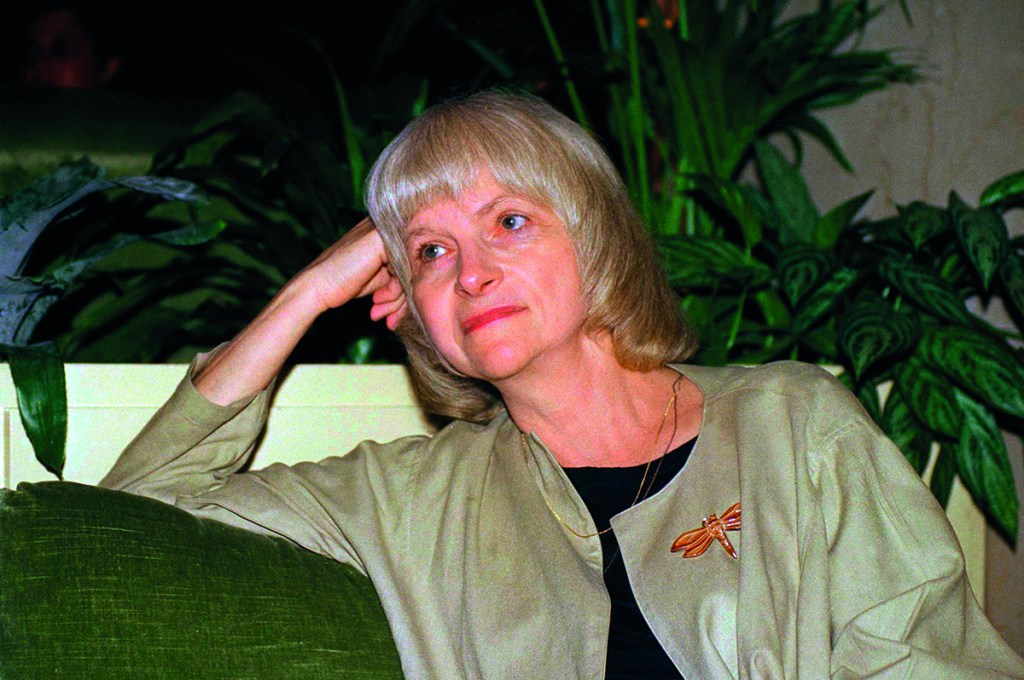I first experienced Alison Lurie’s generosity remotely. In December 1989 my friend Janet Hobhouse was renting Alison’s tiny house on Stump Lane, Key West, and I visited. Janet was terrified after a break-in. Alison, away teaching at Cornell, Kindly arranged for a private security guard.
I first sighted the celebrated novelist on her deck in February 1996, breakfasting on what looked like cereal and Marmite. Stump Lane was sold, and she had bought a house on Reynolds Street, near the Casa Marina Hotel — opened in1920 for travelers on the Flagler Railway from Miami to Key West. The poet Judith Kazantzis and her husband Irving Weinman had arranged for me to rent the second part of Alison’s house, across her deck. She invited us to dinner.
‘She is a girlish attractive woman with straight hair in a swinging grayish-blonde bob and blue eyes,’ I wrote in my diary. Another guest was William Wright, the biographer of Lillian Hellman and author of The von Bülow Affair. (Bill had covered von Bülow’s riveting first trial.) I told Alison about a French woman I’d met on a plane, on a month’s training course in London, who’d asked me if she could go alone to a pub. Alison said I should have suggested London ghost walks. She had found these a good way to meet people.
Key West was full of writers. Each January there was a large joint birthday party on Alison’s deck. The birthday boys were Alison’s second husband, Edward Hower, and the writer Edmund White. Seeing me with Roz Brackenbury, Alison asked if I’d been attracted by her English accent. I said no, I’d liked the way she looked. Alison said she often advised people at a party to talk to someone who dressed the way they did. Roz’s bright outfit, I realized, was like mine. (In 1981, Alison had published The Language of Clothes, and in her 2019 essay collection Worlds and Words she writes: ‘The zipper revolutionized not only dressing but undressing — and in the process changed relations between the sexes.’)
She and Edward — despite a relationship of over 30 years — still held each other in a romantic light. Once when Alison was making pizzas for him and me, we discussed adults changing their names. Alison said Edward had gone from Ted to Edward and added playfully: ‘I once had a lover called Ted!’
Despite her successes — her novel Foreign Affairs won the 1984 Pulitzer Prize — Alison was not stuck-up. She was enterprising and curious and, aged 84, insisted we drive to Duval Street to watch the parade celebrating the centenary of the opening of the Flagler Railway. We settled in a Mexican café and then she went alone to put more money in the meter. I offered, but she was independent and fit — she and Edward swam lengths each day in a college pool.
I told Alison I’d come to Key West for the first time in 1977 on a Greyhound and, at a similar parade, been picked up by a mercury smuggler called Pirate Bill. It had taken me 20 years to realize I’d then been date-raped on his boat. I wondered if Pirate Bill were still alive, and Alison said she hoped not.
I loved her mischievousness. In 2012 I rented Bill Wright’s studio, and he came in secretly and took my paper towels. Alison and Ed White were amused and slightly alarmed when I told them. Alison said Bill probably desperately needed the towels. She suggested I retrieve them stealthily from his house next door. When I challenged Bill he roared with laughter and said Alison had a great sense of plot. (She’d confided to me she enjoyed knowing about others’ exciting lives but didn’t want to lead such a life herself.)
She was beady, loyal and kind. She knew Antonia Fraser through PEN and kept in touch when no longer able to travel to the UK. She worried about Antonia being lonely after Harold Pinter died. Antonia had told Alison of her fury on discovering primogeniture, and how thereafter she’d made her younger brother sit in the bath nearest the plughole. I told Alison that my mother’s diary described how, aged two, I’d threatened my younger brother: ‘I will kill you, I will skin you!’ then covered him with kisses. Alison asked about the book I was then writing on my mother. I said she’d suffered tragedies, one being that brother’s drowning on my seventh birthday. Alison spontaneously touched my arm in sympathy: ‘I know it was a long time ago, but…’
Our last encounter was on February 17, 2020, again on her deck. She wore one of her old-fashioned aprons and, aged 93, made delicious croque monsieurs. I asked her to sign Worlds and Words. Her essay ‘Life After Fashion’ has this warning: ‘An aging woman with bright-red lipstick, especially when it has leaked into the little, otherwise invisible lines round her lips, can look like an elderly vampire, or worse. She can become the sort of terrifying figure that the Ancient Mariner saw on the death ship.’
I laughed out loud while reading this on my plane home.
This article was originally published in The Spectator’s February 2021 US edition.

























